#first gen but american nonetheless
Explore tagged Tumblr posts
Note
wait wait are you swedish?
no 😭 I'm very much American
#first gen but american nonetheless#supposedly according to ancestrydna I have like 0.1% nordic ancestry but that's about as close as I got sorry anon#lyss answers#anon tag
0 notes
Text
An Analysis of the Ubiquity of Mall Brands in the late 1990s to early 2000s, or
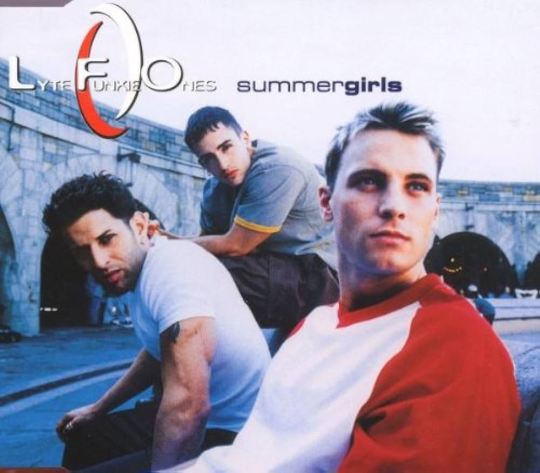
I Fucking Hate These Guys
by OMG!thatdress
If you were a tween to teenager from roughly 1997 to 2004, chances are, you were left with profound life-long trauma caused by someone wearing Tommy Hilfiger, Abercrombie & Fitch, Ralph Lauren, Nautica, American Eagle, The Gap, Old Navy, or, if you were came along a little later, Hollister or Aeropoastale.
I cannot overstate to my young followers how over-saturated these brand names were in teen culture at the turn of the millennium, the extend to which EVERYONE was wearing them, and yet, in a weird way, how light the imprint they actually left on fashion history was.
Watching iconic teen shows of the era, you don't see any of them because a.) TV teenagers tend to be way cooler and more stylish than awkward and desperate real teenagers actually are, and b.) these brands were all copyright protected, which kept their names and logos off the airwaves.
Look in a middle school yearbook, however, you'll see it. Look at your aunt and uncle's high school photo albums, you'll see it. Ask any late Gen X or early Millennial. It was real and it was fucking awful.
The big question is why? Why? WHY, GOD WHY?! There's a lot of answers to that question.
First of all, I'm going to cite this absolutely wonderful article from Collector's Weekly about why everyone's grandma had a hideous orange couch in the 70s, and give the most simple and straightforward answer: it's what was available.
This is when the concept of online shopping is still very much in its infancy, and the hub of American consumer culture was still your local mall. If you needed new clothes, you went to the mall. And guess what stores were at every local mall? You guessed it.
For the second answer, I'm going to dig up this utter relic from the early days of internet meme-ing, that has nonetheless stuck with me and had a profound impact of my understanding of how popular fashion works:
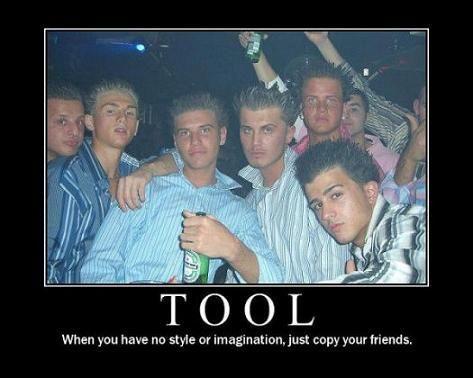
I'm pretty sure that the reason Abercrombie & Fitch manages to survive as a brand today rests solely increasingly middle-aged Millennial men whose sense of style has refused to evolve past the shit their mom bought them in high school.
And why the hell would they? Nobody wore Abercrombie because it made them stand out or feel special. I'm still pretty convinced that nobody actually *liked* the aesthetic or thought the clothes actually looked good. You need not look past the basic color palette to understand these were not brands meant for uniqueness or self-expression.

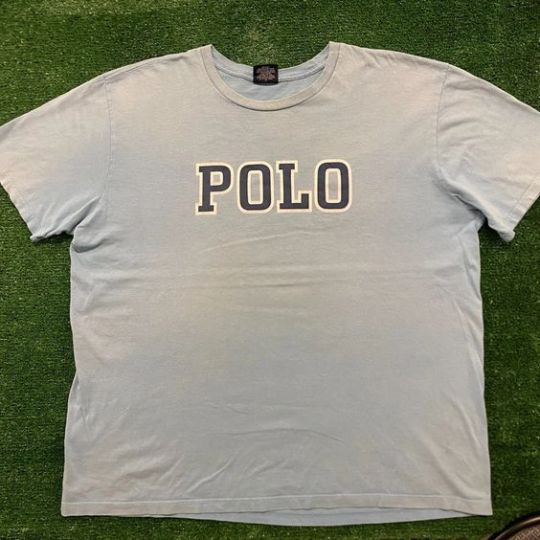
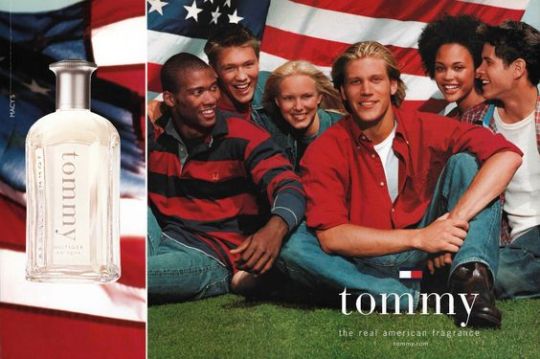
While Britney Spears pranced around stage in her iconic neon colors and body glitter, American teenagers existed in a never-ending hellscape of washed-out neutrals, faded denim, and American flag primary colors.
All of which served its exact purpose: it was safety. It was a way to appear cool if you didn't want to go through the ordeal of actually having a personality or a sense of style. Which, of course, goes back to point number one: it was just shit you bought at the mall because you needed clothes.
It wasn't enough to save you once the school bully caught that whiff of autism and/or queerness on you, but it was enough that you could blend into the herd and pray no one ever noticed you.
Underneath it all was a very subtle undercurrent of class and classism: to wear mall brands was to declare to the world that you could indeed afford to shop at the mall. It meant you weren't, god forbid, poor.
Status symbol clothing goes back to the invention of clothing itself. The concept of brands as status symbols is still very much alive and well, its just more limited to actual luxury brands nowadays. One need look no further than your favorite high-end children's clothing website to see that rich parents still very much think it important that you know their five-year-old is wiping its boogers on Versace.
None of these brands were actual high-end luxury brands, but they still advertised and presented themselves as such. Their ads featured signifiers of "all-american" (read: White) wealth: yachts, skiing, horses, beaches, shirtless dudes with chiseled abs playing verious sportsballs.
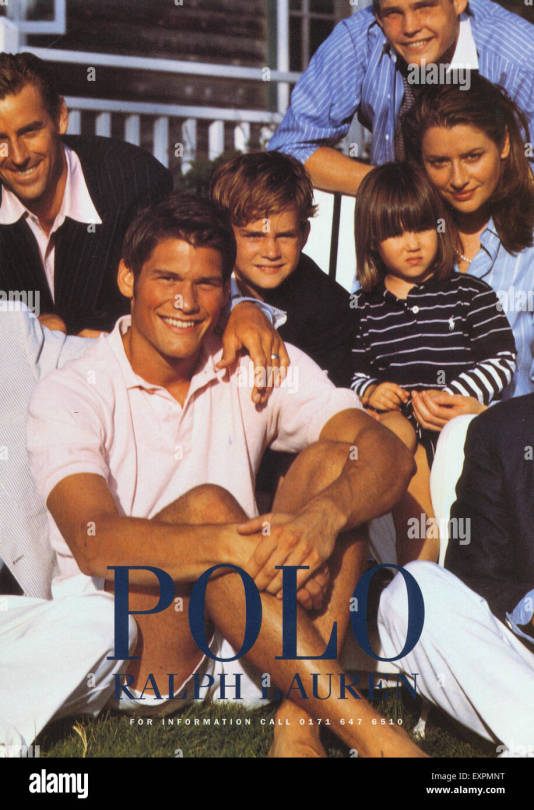
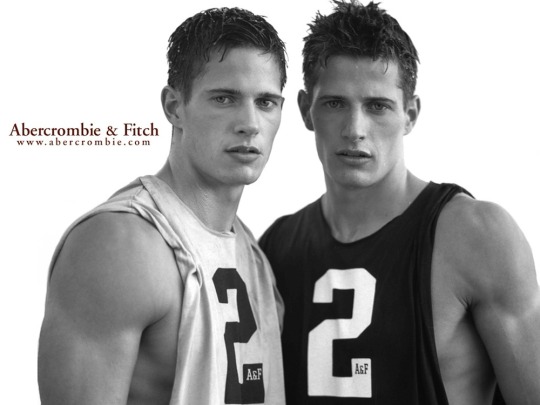

The color palettes and cuts mimicked the preppy "Ivy" style of the New England old-money elite, along with their hobbies and lifestyle. You may not actually own a horse, but you can wear a polo shirt. You may not be able to run without breaking your ankle, but you wear the same shirt as the dude holding a football in the ad.
It was an elitist, White and skinny image that didn't age well into the diversity and body-positivity of the 2010s.
In 2003, a lawsuit was filed against Abercrombie & Fitch alleging systematic racial discrimination. People of color were rarely hired, and if they were, they were given jobs in the back, away from customer view. In 2005, the U.S. district court approved a settlement of $50,000. A few years ago, Netflix released the documentary White Hot: The Rise and Fall of Abercrombie & Fitch which admittedly I haven't watched yet because my hatred runs too deep to remind myself of its existence.
youtube
It was a hatred of Abercrombie & the (white, thin, neurotypical, heterosexual) conformity that it represented that drove me screaming into the loving arms of Hot Topic and Linkin Park. Jordan Calhoun wrote an excellent article for the Atlantic about his experience growing up poor and Black and not fitting in to the Abercrombie aesthetic.
I would be very remiss if I didn't bring up the "urban" mall brands of the early 2000s: Fubu, Sean Jean, Ecko, Baby Phat, among others. They were favored by Black teenagers and White teenagers who wanted to be Black. I know there's a lot to be said about these brands, but I'm too Caucasian to really be able to talk about them with nuance. Maybe someone else will, and I will be very happy to listen.
As much as I hate Tommy Hilfiger, I really do have to give him credit for recognizing the incredibly lucrative "street wear" market and selling power of hip-hop. While most of these mall brands kept their image sparkling White, Tommy made Aaliyah his brand ambassador and regularly appeared in the wardrobes of popular rap and R&B artists of the time.
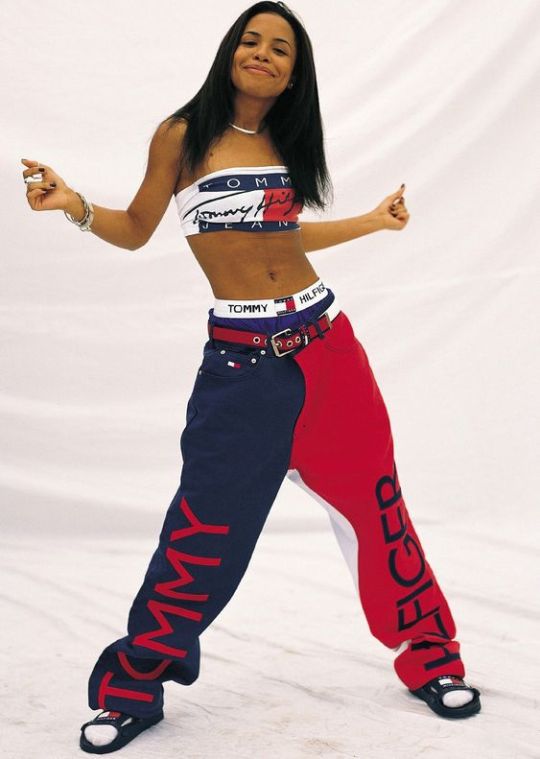
It'd be very easy and very reductive to say that the changing ideology of the 2010s was the downfall of preppy mall brands, but really, the thing that truly killed them was the downfall of the mall itself. Shopping habits changed, and logos and brand names no longer held the power they once had.
The moral of the story is that being a teenager is fucking hell, and these popular brands both offered the safety of conformity and a status symbol to hold over the heads of the poor and uncool. The irony is that everyone who hated them as teenagers (read: ME) and the freaks who grew up to truly love the power of self-expression through personal style (read: ME) became the truly cool people. If you wore Abercrombie you grew up to vote for Donald Trump.
GO GOTH. PREPS SUCK. THE END.
958 notes
·
View notes
Text
I may be too old to be part of the campus protests going on now, but I have the utmost respect for these students and supporters.
The kids in their first years of college? They were born in 2004-6. They were kindergarten age when Sandy Hook happened. They were in junior high when covid hit. They are struggling to choose a path to education that doesn't put their own lives or entire vulnerable populations at risk.
I was born in 1990. The first instance of school violence I knew of was Columbine, and I was 9. The first instance of terrorism or threat to my "normal" was 9/11, and I was 11. My first indication that the US might not be the altruistic big brother of the world was the invasion of Iraq in 2003, I was 13. The first time I realized that family financial situations can change unpredictably, was 2005 (parental medical issues, followed by 08 crash), and I was 15. My first experience being the victim of police brutality was in 2007, I was 17. The first currently-happening protests I knew of were Occupy Wall Street in 2011, I was 21. The first ongoing attempts at revolution I was aware of were Arab Spring in 2012, I was 22. I was in my 30s when I learned colleges support genocide and the military industrial complex. For the first three decades of my life, I was able to convince myself the system was working and progress was happening, at a snail's pace, but nonetheless.
These kids have NEVER existed in a world that felt safe, have never had a future that seemed secure, have never even lived the illusion of the American Dream. The kids who are trying to choose a college that doesn't support genocide were the first kindergartners to do active shooter drills, how do they choose which university to allow to point guns at them? These were the first kids to have to live through, and study the historical impact of Covid, and they saw that the economy is valued above all else. These kids lost their virginity or came out of the closet in a world that was getting safer only to have healthcare taken from them. The world has failed this generation so intensely, and I can only hope y'all hold society accountable.
I have a child now, a true Gen Alpha Honey badger, and I am so hopeful that gen z can lead the charge to making sure my child doesn't have to face these same choices. Go forth, we got your backs, I'm too old and disabled to be front lines anymore, but I'll show up with snacks and do the jail release runs. I'll babysit and cook for when y'all get back from your actions.
#gen z#palestine#columbia university#boycoy divest sanction#the trauma generation fr tho#feral empathy#crossgenerational support#millennial protest mom I'll bring snacks and a first aid kit#lmk what else you need though#happy to help even if i dont understand yalls style or humor or music#solidarity in numbers#millennials#gen alpha
124 notes
·
View notes
Note
Have you learned any new fun facts about cars recently?
Of course!!!
Just today:
I learned that the Golf Country (wicked factory off road version of the Mk2 Golf) was lifted over 4 inches for a total of around 7 inches of ground clearance!


I learned the absolutely mental Cobalt SS was essentially a parts bin special -they had a powerful 4 cylinder from the Saturn Ion Red Line and figured they'd put it in the less weird Cobalt and people would care, which they did- and that its epoch-making 260hp powertrain was only a later upgrade -again, borrowed from another car, the Pontiac Solstice GXP- once the original engine no longer met emission requirements. And that it had a sedan version!!!


And, while writing this post, I looked for details on how this lapped the King-Daddy, longest and most gruelling monster of all circuits that is the Nürburgring faster than the all-wheel-drive six-figure Japanese demigod that is the Skyline GT-R, and found out about the popular misconception that this refers to the R34 Nissan Skyline (right), to date the most coveted and sought after, whereas it actually refers to the R32 (left), a prior version -though not much less groundbreaking in its own time- and that the nonetheless staggering feat may largely be attributable to tire formulations having vastly improved between 1990 and 2008.


I learned of the Ford Transit Sportvan, a confusingly diesel sporty? version of the Ford Transit!


Hell, I learned about a small 20s brand I didn't even know existed!
I find out new things about cars every week, and that's not every day just because most days I run out of time to read and listen and browse all the car-related content I would want to (hence me writing this at 2:30AM, cough cough). Every model has an intricate story usually originating years before its birth, thousands of parts, usually dozens of variations year over year, mountains of media created around it and thousands of examples that have gone around to be featured in movies, owned by celebrities, and participate in history in other thousands of minuscule little ways. Multiply this for thousands of models worldwide and then multiply that for a century and a half. However narrow your area of interest, if you think you know as much as most of the car trivia within it you are absolutely a fool.
Oh wait you were probably asking for an actually fun fact.
Oops.
Well, still today, I learned that our dear Saturn Vue, remember our dear Saturn Vue? Well, not @makenoplans's, the second generation, it turns out that 1. at fucking least it drove well and 2. it died along with Saturn itself when GM went bankrupt and a clause stipulated for the government bailout was to kill three of its brands - Saturn being one of their least successful at the time I WONDER FUCKING WHY I WONDER IF THERE WAS ANYTHING ONE COULD HAVE DONE TO SAVE IT LIKE NOT EVISCERATING ALL LIFE OUT OF IT AND TURN ITS CORPSE INTO AN AMERICAN DISTRIBUTOR FOR A MEDIOCRE GERMAN CAR BRAND i am calm i am calm i am digressing. Well they'd relatively speaking just started making the second gen Vue in Mexico and they were like aw cmon do we really have to stop selling it so soon? And so they just fucking. Used the "Chevrolet Captiva Sport" branding it was sold with in South America to sell it to rental companies. It's basically like a fake ID but it's no faker than the one you started off with.
Oh! And a bit less recently I found out that bafflingly you could get the first generation Honda Civic with three different trunk doors - seen here in increasing order of price and sense.

#saturn vue#chevrolet captiva sport#vw golf country#chevrolet cobalt ss#saturn ion red line#nissan skyline r34#nissan skyline r32#ford transit sportvan#honda civic
12 notes
·
View notes
Text
1840
When was the last time you were sick? How incapacitated were you by the illness/ailment? End of November. A nasty flu had been going around, so even though I just had Covid the month before I still managed to catch the bug and had a 40-degree fever. It wasn't nearly as bad as Covid, but with that high of a fever I still felt very weak and very very cold. My skin felt like glass, and I was too lethargic to eat which didn't feel good.
Do you often reflect on your past in terms of "eras" or “milestone” time frames (eg, looking back and saying, “it’s been 10 years since X”, etc.)? Sure. It just makes things easier to remember that way, and in some ways a wholesome reminder of how far I've come.
Is there something you would like to do or be, but have pretty much accepted it won’t happen because it’s just “not the kind of person you are” or is otherwise incompatible with your personality, character, etc.? I doubt I will ever make it to the WWE just because it's such a huge, HUGE company with highly selective employment (only 800 employees, and that's including their satellite offices worldwide), plus the fact that I am not an American citizen already kills off any chance I'd have. It's a dream I'm not necessarily killing but have nonetheless accepted that it has little to no chance of ever happening.
Such is life.
When was the last time you experienced cognitive dissonance? Not sure when the last time was exactly, but the sample scenario I thought of is whenever I have a short temper at work. I need to remind myself that it, in the words of Gen Z, "it's not that serious." lol
If you use Letterboxd, what causes you to “heart”/“like” a film? I don't use Letterboxd and I don't really watch movies anymore.
Do you like people watching and is it something you do often? If so, where are your favorite locations to do so? Yeah, but I have to be in a certain disposition or location to do it. I like people-watching in foreign countries, or in my university which is open to the public.
Whether you want to have children or not, what do you think has had the greatest influence on your views of children/childrearing (eg, your parents, your own upbringing, your interactions with children as an adult, etc.)? It would be my experiences and realizations so far as I navigate being an adult. What I mean by that is in the time that I've been on this 'journey,' I've been learning that I like being alone. I'm also very focused on my career and, quite selfishly, I like keeping most of the money I earn for myself and for building my life and doing the things I'd love to experience for my own, like traveling. I don't see myself as the type of person who would go for juggling both career and family.
Is there anything that you enjoy that you simultaneously find intensely cringey? Is it so cringey that you wouldn’t normally admit to actually enjoying it? No. Life is too short to be overly conscious of things you like, and lbr people hardly give a fuck as we have our own lives to deal with.
I just spent four days straight spamming the shit out of my Instagram stories with extremely wordy reviews of the first 17 Wrestlemanias - 15-year-old Robyn would have talked herself out of doing that, worrying that people would think she is a loser lol. But I went ahead and did it anyway regardless if people would read it or not, because in the first place I did it for myself thinking it'd be lovely to have an archive of my experiences watching the shows.
When was the last time you felt someone was being dishonest with you — not necessarily downright lying to your face, but acting or responding to you in a way that seemed false or did not feel like their true self? It's been a while since I felt like this.
Similarly, when was the last time you saw a side of someone that made you question your preexisting perception of them? It's an ongoing process currently. Ange was recently transferred to my team, but I was warned that she didn't have the best reputation in her previous department as she was known for being condescending and bossy, especially towards her juniors.
I don't have a final verdict on her yet as we've only been working together for all of two weeks, but it's something I actively have my eyes on.
If you were a doll, what outfit(s) and accessories would you come with? Purple hair, a t-shirt tightly cropped just right above the belly button, denim jeans, white sneakers, and a cute lil handbag hanging on my shoulder. And an Army Bomb hehe.
What was the last bit of praise you received? People complimented my lipstick a few days ago, I guess that counts? Hahaha.
When you hear or see your name written out (as in /your/ name, not someone else who shares your name), do you immediately recognize it as your own, or is there a moment of disconnect before that recognition? Good question. There's definitely a bit of a disconnect, mainly because my name is relatively uncommon and there's that moment of "hey that's me" when I see my name spelled out hahaha
2 notes
·
View notes
Note
I would very much like to know what you meant by "also Snuff is very bad" if such is alright to request
Hey! I let this sit in my inbox for four months. Sorry. I think Snuff is easily the weakest Vimes novel, despite respecting what it set out to do. I let it sit because there's a lot to say. There are three kinda big problems: the way Vimes is written, the way the story is written (plot), and the way the story is written (literary strength). Spoilers for every City Watch book and a couple of others. Very long rant ahead.
Before I proceed with the harsher words here's a bunch of things I liked a lot in Snuff: Vimes being totally enraptured by the goblin music, the goblin cave system, the whole goblin body stuff jar religion ritual, Vimes having sex with Sybil in the tub and generally expressing a lot more Loving His Wife So Much on-page instead of impliedly, the enlisted constable being quite competent and also being really good at kung fu (and his mom being from the Counterweight Continent, shout out to all my half-and-half representation wherever I can find it), Willikins being Vimes's fixer. The one noble guy who hated his evil wife. Stinky and the Harry King sections (very first-gen son vibes). The jokes about the river. Nobby once again maybe Finding Love.
And before I proceed again, I think that as an American this very sort of setting is alien to me in a way that Ankh-Morpork or Koom Valley is not. Landed gentry and estates are, despite our stupid amounts of physical geography, not as a big part of our cultural storytelling, for various reasons. And at least for a few more decades pending the outcome of revisionist educational legislation, thanks to the aftermath of the Civil War, we generally do see owning a large property with a fiefdom of workers as a trait difficult to associate with heroic figures, Gone With The Wind nonwithstanding. So when something is set at an estate and concerns explicit class divisions, it unavoidably gets read as a Genre. (Contrast the class division stories that take place inside Ankh-Morpork, which are more explicitly about moneyed power that more incidentally happens to be associated with peerage, e.g. The Truth or Feet of Clay. In these books Lord de Worde, Selachii, etc. could be replaced by old-money Families that are nonetheless not 'noble' like the Vanderbilts, Rockefellers, etc without too much narrative dissonance, I think. Men at Arms is an outlier but after that the stories are less about AM's True King and more about political jockeying.)
I think giving it the 'this is a pastiche of Pride and Prejuidice-style writing' handicap can make up for some of its deficiencies, but at its core it simply does not read like, say, any other Vimes novel (this isn't unique to Snuff; I think as Pterry's faculties went, all the books after Making Money (disclaimer: I have never read the TA books and people say Wear Midnight is superb so I make no claims there) really read differently than everything before. The prose is less tight, the courses of events are less clear, and the characterization is spottier. The themes don't resonate as clearly.
Vimes: Vimes's dogged determination to think of himself as Just A Guy Who Cares About Justice is undermined in Snuff by two major factors: his willingness to use his power in conflicts against those with less power than him (e.g., the various scenes set at the pub) and his explicit utilization of the powers of the Summoning Dark. Vimes's various trials and successes have come from his bloody-mindedness and determination to remain himself despite the changes in his life.
Regarding power, social: In previous novels we see Vimes more a (narrative) victim of his status than a deployer of it, as both a running joke and a driver of the plot. (Don't confuse the creature comforts of wealth, such as daily bacon sandwiches and soft beds, with the auspices of power, which affects other people.) He only chooses to use it when he can't win a fight as himself, and then, reluctantly. In Feet of Clay, the coat-of-arms machinations bewilder him, and when he finally confronts Dragon King of Arms he does it as a public servant making an arrest. In Fifth Elephant, he is forced onto the trip because of his dukedom (Vetinari understanding, of course, that he is the only person who can solve the Wolf Nazi problem). We see him resolving conflicts with physical violence (bandits) and mangled street diplomacy (dwarf inspectors) before finally being forced to resort to noble privilege for the sake of another (in protection of Detritus's civil rights). He is sent to prison and then onto The Game in spite of his power, and makes it through because of his personal qualities (see power, supernatural below). In Thud! he is humiliated by his inability to remain equals with his house staff. In Snuff, despite the initial discomfort with the role he expresses during the mandatory opening Vetinari session, he doesn't interact with his household outside the twirling maids and Willikins (who has distinguished himself as somewhat of a wildcard character at this point in time). At all times he knows he is in charge of the hermit, the pub and its owner, the farmers, and the rest of the villagers. For a character so set on being a civilian, he adapts quite quickly to nobility once removed from the city and the presence of other 'nobles'. And maybe this is the point of the book, but if so, it doesn't come across clearly at all. Furthermore, when he's not wielding noble power, he's constantly kicking down doors and asserting I AM THE LAW! at a level of arrogance we've seen him think but never before act upon without an active foe (contrast Night Watch, where he pulls rank on Quirke when challenged and negotiates with civilians on the barricade far more than he barks orders).
Regarding power, supernatural: Vimes has survived 40+ years of rough living via grit and instinct. We know he's an excellent street fighter, though not the best. The 'special' traits that Vimes has up through Thud! are his instincts - his character-central curiosity (bloody-minded suspicious bastard!), and his connection to and control over pure animal rage, aka The Beast. In Fifth Elephant he deploys it to make it through the Game and collars it when the fight is no longer about survival but domination. In Night Watch, it again emerges but is consciously caged in the service of human justice (fairness and example-setting, in the case of the torturer, and due process, in the final fight with Carcer). Either way, the 'power' comes entirely from within, and is not magical in any way, shape or form - and fittingly, the corralling of a force that stems from prehumanity is itself a very human thing to do.
In Thud!, a bunch of themes introduced in Fifth Element get developed in cool ways - religion, ritual, darkness, curses, and 'endarkening' - and the apotheosis comes when Vimes's internal rulekeeper overpowers an ancient force of evil because he loves justice and he loves his son. (Other people have written pretty thoroughly about how the conscious decision to be Good when you could so easily be Bad is the core of both Vimes and Granny Weatherwax's characterizations, so I won't expand on that too thoroughly.) The Summoning Dark is effectively exorcised, and the scar it leaves is power enough to intimidate the remaining dwarven obstacles in the denouement.
In Snuff, Vimes literally has magic powers thanks to the Summoning Dark. He can see in the dark, understand language in ways he should not, and develops an explicitly supernatural sixth sense. While the darksight is kind of cool, and fits his character well as Avatar of Night Policeman, the fact that the book continually points out that he got it from the SD is a burr on the coat of the narrative. He does things another person wouldn't be able to do, and cites his magic demon over and over for it.
Story, plot: Every City Watch book is set up in the same way: (optional) cold open, interpersonal theme Z is introduced, plot X (A Detective Problem) is introduced, plot Y (A Second Problem) is introduced, sometimes Y before X. (I hesitate to call these A and B plots because the importance of each varies from book to book.) Things happen, the plots eventually join up, plot climax, emotional/character climax in which Vimes or another watchman reaches or proves an important point to themself or us, denouement. I have no problem with this formula because it is broad enough to include within itself infinite room for variation. Some quick examples: Feet of Clay (Golem looks for work/assassination attempt. Cheery comes looking for work and is a girl. Golems are robots. Someone is trying to kill Vetinari. Vimes has to get a coat of arms. Story occurs. The case gets solved and it was connected to the golems. Golems are people, not robots. Words In The Heart Cannot Be Taken. People matter. The Vimes coat of arms gets restored.) Fifth Elephant (There is a divide between the Old and the New. Racial tension. Cheery is coming out more loudly. Someone has stolen the replica Scone and killed three men. Vimes gets sent to Uberwald. Story occurs. The case is solved and it is connected to the coronation. Angua and Vimes both assert their humanity and agency by refusing to abuse their power to kill even when it would be expected of them. Change and cultural development is not a threat to and is indeed even crucial to the survival of traditional institutions.)
I don't think a deviation from this structure is a bad thing, but the structure is so strong that it's much easier to follow the story built upon it.
In Snuff, we get a cold open (goblin stuff) and an ostensible Y plot (Vimes Is Forced To Go On Vacation To the Countryside). But what is the X plot? Is it that there is smuggling and human (goblin) trafficking? Is it the murder on the hill? Is it Mysterious Noble Bullshit Vimes sniffs out? If pressed, what is the Z theme? That goblins are people worth respecting? It's not this. This is readily made explicit to us by Ms. Beedle long before even the buildup to the book's action climax (the river chase). There's no show, only tell - we never learn something a character doesn't tell us. Vimes spends the whole book picking fights in the village, lecturing other nobles, and being told things about goblins. The most interesting development is his mentorship of Constable Upshot, but it's inconsistent and oscillates wildly between "sir, you don't know what you're talking about", surprising competence, and hero worship, with no directional progression. When Vimes and the Watch get to Klatch and discover the slave plantation they deal with it. The scene that occurs when the emotional climax would be expected - Stratford coming for Vimes's life on the river cruise - doesn't tell us anything new about the characters, their beliefs, or moral themes, just that Vimes is a Badass. The lesson Bad Men Do Things For Money could have been developed by giving Stratford a foil (maybe in the form of the constable, another commoner who chooses to be a Good Man, by giving Upshot moral dilemmas he resolves on-page). Similarly, the most cohesive Theme suggested by the climax and denouement isn't that Goblins Are People but that Commoners Are Just As Likely As Lords To Treat Goblins As Unpeople, which is miserably pessimistic. Vimes doesn't learn anything and neither do we.
Story, literary critique: Other books - not just City Watch books, but books like Going Postal, Carpe Jugulum, and Thief of Time - are both generous with narrative inclusion (we get scenes from the perspectives of the antagonists without being spoiled and from the perspective of deuteragonists or side characters). At the same time, we always know what our characters are thinking or feeling at any given time, even when they don't know what is going on or are acting with a hidden motive, because of strong characterization and effective foreshadowing. Stanley and Mr. Groat get scenes to themselves in GP that develop their characters and the mythos of the Post Office, and later we know Moist is up to some zany shit when he sets up all those prayers and then digs up his haul. Granny Weatherwax Weatherwaxes the Magpyrs after demonstrating Borrowing and her utter loyalty to herself and the land, and the Magpyrs have plenty of scenes with Agnes and one another. The Auditors have scenes that develop the fact that being human makes you human, setting up Myria's eventual meeting with Death. Back with Vimes, in The Fifth Elephant, when the chandelier falls and he gets sent to prison, he's just as confused as we are. When he escapes, we understand every part of his process as he comes up with it, moment by moment. Vimes in particular has a very visceral, real-time narrative which I think leads to why his characterization is so strong. (Contrast this with Carrot, for whom outside of Guards! Guards! and his letter-writing we never really know quite what he is thinking.) When Vimes is in the scene, we're basically never outside his head - EXCEPT in Snuff. In Snuff, there are at least as many scenes where we only know that Vimes IS doing things, not why he's doing them, or how he feels. The book reads like sometimes, it's someone else telling a story about Vimes's adventures, only recording the events that occur instead of telling us how the characters feel during them. And this is in part due to the fact that PTerry had help writing it; his wife and other friends helped him finish it (and also Raising Steam). Etiology aside, it's incredibly awkward and alienating to be forcibly removed from the interior of a character we've grown to know so well.
Additionally, the few scenes that don't follow Vimes are back with the City Watch, and their characterizations are similarly hollow. Fred Colon is bizarrely bowdlerized in order to motivate the unngue pot thread. There are no scenes like Fred and Nobby's co-dialogues that secretly set the stage (as in Thud!) or develop the characters (like Angua and Sally, also in Thud!). We come close with Cherry and Igor possibly discussing Old World Beliefs, but it's curtailed almost before it starts. The characters are there simply to say their lines and start the investigation, and bear little resemblance to the characters we've grown to know (compare Thud!, in which Detritus's pursuit of drugs is plot-relevant but informs his personal character as an ex-con and a troll looking to start a family, or where Angua and Sally's co-investigation is an opportunity to demonstrate Angua's neuroses).
Finally, in Snuff, the villains are ambiguous and unimportant. It is ultimately borne out to be Rust the Younger, but at that point it hardly matters. We know the Rusts are rotten, and in fact it's kind of refreshing to see one of them actually commit an on-page crime and get nailed for it instead of vaguely be awful (MAA, Jingo, Night Watch). But it's only Rust Jr. because the book reads like a big collection of callbacks to the other books, pointing to things and going say, remember that? Remember Blackboard Monitor Vimes, and the Summoning Dark, and Lord Ronnie Rust? How about Koom Valley?
Vimes spends the book clearing through sub-villains like a new game plus gamer plowing through midbosses. I had to reread the last half to remember the names of Flutter and Stoner and Stratford and all the other mooks. Working for money is a fine motivation for a villain - see the New Firm in The Truth - but these guys are wholly interchangeable and completely forgettable.
TL;DR Despite Night Watch being the isekai, Snuff is the book where Vimes is the boring invincible protagonist who barrels through people and obstacles with wealth, political power, and literal superpowers yet no interesting motivations, and we don't learn anything and there aren't any cohesive themes and the vast majority of the scenes are shoddily written and I don't care about any of the characters except maybe Feeney Upshot. Night Watch was the culmination of Vimes's personal themes, redundantly made textually explicit in Thud! (unnecessary but still a fun time because all the other shit was rad), and any future City Watch writing should probably have been relegated to elements in the Industrial Revolution books. Or about Angua.
#discworld#long post#sorry. snuff is so bad because all the other books are so good. night watch is still my favorite novel of all time.#my personal opinion is also that when vimes retires angua should take over the watch not carrot. and cherry should make captain.#like really long post.#powstuff#would you believe how many times I wrote the fifth element instead of the fifth elephant.#loth-catgirl
7 notes
·
View notes
Text
Grave of the Fireflies

Grave of the Fireflies is, like Barefoot Gen, is a story about World War II-era Japan from a very human perspective. The story follows two siblings, Seita and Setsuko Yokokawa, after an American firebombing of a Japanese city separates the family. While their mother goes to a shelter, the siblings leave the town and seek shelter elsewhere. After the firebomb is over, the siblings go to look for their mother. While they are being checked out by a doctor, their aunt comes to inform them that their mother has been injured, and that Seita, the older sibling, needs to go see her. Seita goes to the building where the injured are being kept, and Identifies his mother based on a ring she had on her person. His mother is terribly injured – wrapped in bandages with only her eyes and lips exposed. The soldier informs Seita that his mother will have to be transported to the only hospitsal nearby that has not been bombed. This is the last time Seita and his mother see each other.
The film is much more grounded than previous films and series I have had to view for this class. I cannot in good faith say that it is a welcome change of pace as the films are about war, but it is a change of pace, nonetheless.
The film’s title comes from a moment in the film when Setsuko, the younger of the two siblings, makes a grave for the fireflies she and Seita had brought into their shelter the night prior. She does so after recalling the fact that her mother had passed (a fact Seita had wished to keep secret from her but their aunt had told Setsuko about). With frustration over her mother’s passing, she buries all of the fireflies they had caught, a metaphor for Setsuko burying all the good in her life.
The film’s emotional climax is when Setsuko dies from malnutrition, a fate suffered by so many men, women and children due to the ravages of war. Cruelly, this happens just as Seita is cooking Setsuko’s first meal in weeks.
Grave of The Fireflies is a film about the cruel effects of war on people. It kills them, it injures them and it leaves them scarred for life. However, war must never be forgotten, lest we let it happen again and again.
P.S. I know war happens all the time, but I hope you understand my sentiment.
0 notes
Text
Miss Saigon in Manila!
Here in the Philippines, even if you're not a fan of musical theatre, you'd definitely know about Miss Saigon and Lea Salonga. That's how big this show is to many people here. The last time this show was in the country was way back in 2000, with Salonga herself playing the role of Kim. It also blessed us with a full pro shot available on YouTube, giving me and my fellow Gen-Z theatre fans a glimpse of Salonga in her most acclaimed role.
Fast-forward to 24 years later, and Miss Saigon is finally back, stopping in the Philippines for their international tour. My mother has been such a huge fan of Miss Saigon. As a child, I remember her playing her Original London Cast cassette (double tapes, of course, one of each act) and singing along to "I Still Believe." In 2014, she also bought me the cast recording of the West End revival, and I used to play this a lot because I was obsessed with Eva Noblezada's voice.


So, of course, there's no way we're going to miss Miss Saigon in Manila (even if we had to travel miles and ride a plane!) Along with us was also my older brother and his girlfriend. Watching this musical with my family was so, so exciting and certainly just too much for one heart.


This is my third show in the Solaire theatre, and so far, Miss Saigon has been the first to blow me away with its production. Don't get me wrong, the Phantom's Lair from POTO and the revolving stage from Hamilton were amazing, but Miss Saigon's production was so extravagant and spectacular that my mouth was just hanging open the entire time — especially during "Kim's Nightmare." That helicopter scene was just so fricking cool.
The story itself can still be a hit or miss. While some aspects are not as offensive as the original run (changing the lyrics in The Wedding Ceremony to actual Vietnamese words, for example), the show is still far from perfect and has so many dated themes... which I fear could never be corrected properly even in the future. There's simply no way you can make productions of this musical without including the problematic parts, so I understand why some people don't like this show. However, I'd argue that the show is not a white savior story. Is Chris really a white savior if he didn't get to save Kim in the end? He's not the hero of the story. (No one is; it's a tragedy.)
Nonetheless, there are still so many things to like about Miss Saigon, especially the score. Les Misérables is one of my favorite shows of all time, but Miss Saigon's music kicks its ass any day. While Les Mis has better individual songs, Miss Saigon's overall score always brings a chill up my spine. In addition to "Kim's Nightmare," "This Is The Hour" is one of my favorite moments and that's all because of the soaring music and the ensemble.

I also enjoyed the incredible cast during our show. Everyone was superb and amazing at bringing this show to life. Abigail Adriano, who played Kim, astonished me; how that powerful voice came out of such a small girl is beyond me! She's only 19, but wow, she commanded the stage like a pro and transported the audience to another dimension with her vocal chops alone. Her versions of "You Will Not Touch Him" and "I'd Give My Life For You" were too good. Her acting was also on-point. Adriano's Kim was so gentle yet strong and fearless. My family and I also got to stagedoor (my first time!) and when we approached her, I jokingly said, "You made me cry!" to which she replied, "I'm sorry!"
I was so looking forward to watching Seann Miley Moore as the Engineer ("EnginQueer," if you will). Instead, we got Nicholas Kong, who was such a great scene-stealer! His version of "The American Dream" absolutely gagged me — and not just because of the visuals. His Engineer also reminded me so much of the Thenardiers from Les Mis than other versions I've seen: funny but also a scheming menace.
Nigel Huckle played Chris in this performance and was also terrific. See, I've never warmed up to Chris in other versions. Some Chris actors are too aggressive, and I feel like they don't really care about Ellen in Act 2. But Huckle was different; he also even actually made me feel sorry for Chris. I can feel his desperation and confusion in "Why God Why." He also shared really good chemistry with Adriano; their "Sun and Moon" was too perfect.
Another performance that I was so looking forward to was Kiara Dario, who played Gigi. I've been seeing a lot of her tweets and simply loving her theatre-girl energy so much. A homegrown Filipina talent, she showcased everything: her impressive dance moves (no wonder she's part of a girl group here in the Philippines), her vocals, and of course, her acting. I'd love to see her in another big role soon or even grace the Broadway stage.
Here are some pictures from my first stagedoor (I wish we'd had more but we got so overwhelmed and frankly, we got tired from the very long day):




Overall, just a really fun night in the theatre with my family and so many wonderful performances. Definitely one for the books!
#personal#miss saigon#miss saigon manila#miss saigon international tour#the theatre at solaire#musical theatre#musicals#abigail adriano#nicholas kong#nigel huckle#kiara dario#i love theatre so much
1 note
·
View note
Text
In a latest research performed by Coinbase, a paradigm shift has emerged among the many younger American inhabitants. A formidable 38% of youthful People now imagine crypto and blockchain expertise can present important financial alternatives not generally discovered within the conventional finance sector. Curiously, this stands in stark distinction to older generations, the place roughly 26% share the identical perception within the potential of blockchain expertise. Youthful Generations Attraction to Digital Property The gravitation in direction of cryptocurrencies is predicated on extra than simply disillusionment with the normal system. There's a proactive push from younger folks to scour for brand new financial alternatives aligning with their existence and monetary wants. As per the study, youthful generations are extremely pissed off with the present monetary system. In keeping with Coinbase’s report, solely 9% of Gen Z (18-25) and 19% of Millennials (26-40) nonetheless imagine within the attainability of the American Dream by standard means. Solely 7% of those demographics imagine the present monetary system serves their wants properly. Over 52% of the respondents within the research interval reported rare use of the system, with fewer than 20% contemplating the U.S. monetary system superior to these in different international locations. Furthermore, about 31% of youthful people personal cryptocurrency in comparison with 12% of older generations. 16% of the youthful folks observe that the worldwide availability of digital belongings is a compelling attribute for crypto. Curiously, the report additionally signifies that since most millennials and Gen Z adults have grown up utilizing internet-based purposes, they anticipate monetary establishments to adapt to fashionable expertise. Due to these expectations, most youthful generations confer with the system as political, costly, outdated, and never revolutionary or speedy. About 30% of millennials and Gen Zs aged 18-40 assume the system is expensive, whereas about 19% take into account it complicated. Youthful Generations to Affect Future Elections The query of subsequent yr’s election was requested to the respondents, and in response to Coinbase, 51% of the youthful ones signaled a risk of supporting crypto-friendly candidates within the upcoming 2024 elections. The variety of Millenials and GenZs adults representing 40% of the voting inhabitants. Furthermore, by 2028, millennials and GenZs will seemingly characterize nearly all of American voters. About 39% of the youthful technology believes that “politicians and policymakers ought to help applied sciences like cryptocurrency and blockchain to assist future generations, versus 28% of older People.” This report is a part of Coinbase’s ongoing analysis on crypto. The earlier report talked about that over 50% of Fortune 100 corporations are wanting into blockchain tech to remain aggressive. In one other ballot by Coinbase, it was established that about 55% of voters would like a candidate who backs web3. SPECIAL OFFER (Sponsored) Binance Free $100 (Unique): Use this link to register and obtain $100 free and 10% off charges on Binance Futures first month (terms).PrimeXBT Particular Provide: Use this link to register & enter CRYPTOPOTATO50 code to obtain as much as $7,000 in your deposits.
0 notes
Text

Russian Warplanes Are ‘Trying to Dogfight’ US Jets Over Syria, General Says
��Don’t take the bait,” the region’s top Air Force general warns pilots.
MARCUS WEISGERBER | APRIL 27, 2023 07:04 PM ET
AIR FORCE MIDDLE EAST RUSSIA SYRIA
Russian warplanes are flying increasingly close to American fighter jets in the skies over Syria “like they're trying to dogfight,” the top U.S. Air Force general in the region said.
Since March 1, Russian pilots have acted in hostile ways that have U.S. military leaders concerned about the possibilities for miscalculation and escalation.
The Russians have been “increasingly bellicose in how they're approaching us,” Lt. Gen. Alexus Grynkewich, who leads Air Forces Central Command, said in an interview. “They're maneuvering aggressively against us when our protocols would say we're supposed to stay… several miles apart and just monitor each other.”
“[T]hey're aggressively maneuvering, almost like they're trying to dogfight, if you will,” Grynkewich said. “That's very concerning.”
Dogfighting is a term used to describe planes engaging each other in aerial combat.
The general’s message to his pilots: “Don't take the bait.”
“The guidance that I've given our folks is we're not going to act like they are,” Grynkewich said. “We're going to act in a professional manner, and we're going to try to de-escalate the situation.”
Since U.S. aircraft rarely fly alone, there are multiple aircraft to protect one another.
“We always try to keep one of our fighters in a position of advantage with respect to the Russians as they're trying to do the maneuvering against the other one,” Grynkewich said. The other [American] one basically, tries to de-escalate, to shake them, to get them to turn and go a different direction.”
The Wall Street Journal first reported increasingly hostile interactions between American and Russian warplanes, but not the dogfighting.
For years, American and Russian jets have shared the skies over Syria. U.S. aircraft have been fighting ISIS while Moscow’s planes have backed the Syrian government’s efforts to suppress anti-government rebels. U.S. and Russian military officials communicate regularly on a “deconfliction” telephone, sharing details about planned missions, including aircraft call signs and planes’ electronic transmission codes.
The two sides still have “some technical and professional exchanges” on the phone, Grynkewich said. “I think that that is good that the phones are still ringing, the phones are still being picked up. But the physical manifestation of their behavior is concerning nonetheless.”
And the general said U.S. officials’ complaints about the encounters with Moscow appear to fall on deaf ears. Russian forces will say these long-standing protocols “don't apply anymore in this particular area,” he said.
In mid-March, a Russian Sukhoi fighter jet collided with an American MQ-9 drone over the Black Sea. Russia’s defense minister awarded medals to the pilots, which Grynkewich said could encourage other Russian pilots to fly aggressively.
“Tactically, I think they're becoming less disciplined as an Air Force, and operationally, the things that their leadership is asking them to do or allowing them to do is really undermining my assessment of them as a professional Air Force,” he said.
Armed Russian warplanes have also flown over American ground troops in Syria.
“I don't think there's any intent on the Russians to fire on an American, but the risk of miscalculation or someone just making a mistake is way higher than it needs to be,” Grynkewich said.
0 notes
Text
diary post, nothing grim but a diary post nonetheless:
so (expectedly) I have to take a certain amount of gen eds to graduate. now here, it has to be a certain amount each year rather than by whenever you finish your degree. anyways first semester I was way too busy Adjusting to everything here to even Think about registering for any gen eds. now as for registration for gen eds for the upcoming semester, I was still not entirely certain how everything works (unlike American universities, one does not have meetings with a counselor who Explains Everything and even helps plan here). so I let the first registration period pass, and now we're well into the second. anyways, I Have to select a course so I pushed myself to do it tonight and many classes that would be interesting to me are full. but I found one! it meets my requirements for this year and seems like a course I will like. it was actaully not very difficult at all to figure out requirements and how registration works so I regret not doing so earlier, but that's okay. I still got something good and now I know what to do in the future. plus learning more about myself in terms of my neuroses and how to overcome them. I learn and become better connected to the world!
1 note
·
View note
Text
Impact of the French Revolution on the Caribbean.
The Caribbean basin was first to experience a large-scale armed struggle that was directly provoked by the Revolution, and it later served as a vital theater of the Revolutionary Wars. Six European powers- Britain, Spain, France, the Dutch Republic, Denmark, and Sweden- were actively vying for the Caribbean. Of these, Britain and France were particularly attentive to the region in the wake of the Seven Years' War, after which the focus of the rivalry had largely shifted away from North America and India to the Caribbean colonies [...]
The French Saint-Domingue (present-day Haiti) was the single richest colony in the Americas and played the leading role in sugar production. In 1789 it counted some eight thousand plantations that employed half a million slaves, who represented 89 percent of the colony's population; there were just thirty thousand white inhabitants, slightly more than the number of free people of color (gens de couleur). Saint-Domingue was at the center both of a global commercial system that successfully circulated people, commodities, and ideas and of a complex web of diplomatic intrigues. Traditional colonial competition between European powers in the Caribbean was complicated by the outbreak of slave uprisings following the French Revolution.
[..]
Surprisingly, the profound upheaval produced by the American Revolution had limited impact on the Caribbean colonies, and recent scholarship assigns no significant role to the American struggle against Britain in the Haitian uprising against the French masters.
The French Revolution was different. It led to the start of a new conflict between Britain and France over the Caribbean because the economic importance of colonial production to European commerce ensured that there would be intense efforts to secure control of the West Indian islands. The traditional colonial rivalry, however, was complicated by slave uprisings unleashed by the Revolution. Revolutionary events in France, especially the Declaration of the Rights of Man and of the Citizen (August 1789), had an immediate effect in the French colonies, especially Saint-Domingue; there was a slave insurrection in Saint-Pierre, Martinique, in late August 1789, another in the south of Martinique in November. Honoré Mirabeau, one of the most promined leaders at this early stage of the Revolution and an active member of the Société des Amis des Noirs, publicly argued that the Declaration implied that "there are not, and cannot be, either in France or in any country under French laws, any other men than free men, men equal to one another." Wealthy white planters hoped to gain autonomy for themselves without risking the abolition of slavery, while free men of color desired to gain the rights listed in the Declaration of the Rights of Man and of the Citizen. White planters insisted that the Declaration did not apply to people of color, and debates over mulatto citizenship increasingly turned violent.
In September 1790 civil strife broke out between aristocratic planters and patriots of the towns of Saint-Pierre and Fort-Royal on the island of Martinique. In December there were attempted insurrections in French Guiana and on the island of St. Lucia, and in April 1791 slave unrest erupted in Guadeloupe. The French National Assembly's decision in May 1791 to grant full citizenship to all financially qualified men born of free fathers and mothers led to open street battles in Port-au-Prince in Saint-Domingue, and by early November 1791 several parishes in Martinique were roiled by slave revolts. The question of freedom and citizenship as well as the ongoing political turmoil incited slaves to rise up against their masters in the densely settled plains and hills of Saint-Domingue's northern provinces. Nonetheless, this strife in the French colonies did not immediately divide plantation owners and their slaves. Throughout 1790 and 1791 the former successfully employed the latter to bolster their military strength and to overcome their revolutionary rivals. Between 1790 and 1792 the royalists triumphed in Guadeloupe and Martinique, but in both cases they owed their victories to having armed the slaves. Indeed, throughout this period both the patriots and the royalists competed in their efforts to attract the rebel slaves to their side. By the summer of 1791 however, the revolutionary turmoil began to be felt outside the French colonies as well. Within a month of the initial uprising, British authorities were able to contain threats of slave uprisings in Jamaica. The British sent a delegation to the French plantation owners with an offer of aid against slaves. The Spanish in the eastern half of the island, meanwhile, exploited an opportunity to enrich themselves by selling arms and supplies to the insurgent slaves. Though relations between whites and mulattos remained tense, the free colored militia were key in fighting the slave rebels and in the process accelerated recognition of their civil rights. On April 4, 1792, the French National Assembly extended citizenship to all free men of color, hoping this measure would win their loyalty and support. Just sixteen days later started a war that changed the world.
Alexander Mikaberidze- The Napoleonic Wars, A Global History.
#french revolution#xviii#alexander mikaberidze#the napoleonic wars: a global history#the caribbean#saint-domingue#haiti#martinique#guadeloupe#guyane#saint lucia#jamaica#civil rights#freedom#slave uprisings#impact of the french revolution
102 notes
·
View notes
Photo

American Family Association (Facebook)
A survey by Gallup recently revealed that 81% of American adults believe in God, the lowest percentage since 1944. Between the early 1940s — when Gallup first started conducting the survey — and 2011 more than 90% of adults believed in God. Although a vast majority of Americans still do believe in God, 17% do not, a number that David Closson, Family Research Council’s director of Christian Ethics and Biblical Worldview, thinks is linked to the cultural, political, and spiritual state of the country. “The latest Gallup poll is not surprising to me,” Closson explained. “Research has shown us that the ‘no’s’ — those who don’t know or don’t care about what they believe — has steadily been rising. While it’s sad that less Americans believe in God, it’s nonetheless predictable.” Surveyors asked American adults to respond to the question: “Do you believe in God?” with “yes,” “no,” or “no opinion” as the possible answers The responses were not meant to signify whether or not the person is a committed Christian but rather shows that they believe in a higher power regardless of religion or practice. There are multiple factors to consider when assessing the 6% drop in adults who believe in God over the last five years. Gallup’s data shows that belief in God has fallen the most among young adults and people on the Left side of the political spectrum. Between 2013-2017, 84% of the respondents who identified as Democrats said they believed in God. But this year, that number has declined by 12 points to 72%. Alternatively, in 2013-2017, 95% of the respondents who align with the Republican party said they believe in God. In 2022, that number has dropped by three points to 92%. “Over the last 30 years, the two main political parties in this country have diverged on almost every issue,” said Closson. “Increasingly, Democrats are less religious and less tethered to the principles of God’s Word. As a result, it isn’t surprising that less Democrats believe in God today as in previous years.” Interestingly, more people of color said they believe in God than non-Hispanic white people. Of all the Black, Hispanic, Asian, Arab, or Biracial respondents between 2013 to 2017, 92% claimed to believe in God. The subgroup now stands lower at 88%. For non-Hispanic whites, 85% claimed belief in God in the same five-year timeframe, compared to 79% who claim belief now. In 2021, Family Research Council’s Center for Biblical Worldview conducted a survey that revealed how different generations subscribe to a biblical worldview. Compared to simply proclaiming that one believes in God, this survey tested how engaged participants are in their faith and how it aligns with Scripture. In the 64-question survey created by Dr. George Barna of Arizona Christian University, respondents had to get a score of 80% to be classified as Christians that ascribe to a biblical worldview. “Studies show that 8% of Baby Boomers have a biblical worldview compared to 6% of Gen-X and 4% of millennials,” said Closson. “For Gen-Z, that number is even lower. As less people have a biblical worldview, we can expect less people to hold the tenets of a biblical worldview (such as belief in a triune God).” Closson predicts that the number of people who believe in God will continue to drop. “These numbers ought to motivate Christians to do what Jesus told us to do which is share the gospel, discipline our children, attend faithful churches, read Scripture, and seek to be light and salt (Mat. 5:13-16),” Closson advised. “Jesus warned us that we would experience persecution (see John 15-16), so we shouldn’t be surprised when we find ourselves in the minority. Rather than be discouraged, we should seek to honor the Lord in every way we can.” 𝑃𝑢𝑏𝑙𝑖𝑠ℎ𝑒𝑑 𝑖𝑛 𝑇ℎ𝑒 𝑊𝑎𝑠ℎ𝑖𝑛𝑔𝑡���𝑛 𝑆𝑡𝑎𝑛𝑑.
6 notes
·
View notes
Text
Pioneering Black educator's statue to replace Confederate statue at the Capitol

The statue of Mary McLeod Bethune, a civil rights activist born to former slaves, will represent Florida in the National Statuary Hall Collection, starting in 2022.
Civil rights activist and Bethune-Cookman University founder Mary McLeod Bethune will soon make history again.
She will be the first Black person to represent a state in the National Statuary Hall Collection at the U.S. Capitol in Washington, D.C. The renowned educator’s Florida-commissioned statue will be placed permanently in the Capitol in February 2022, replacing the statue of a confederate general.
Standing at 11 feet tall and weighing in at 6,000 pounds, the statue shows Bethune in a cap and gown to signify her dedication to education. It also features a stack of her own books piled next to her. A smaller bronze version will also be placed in Riverfront Park near Mary McLeod Bethune Boulevard.
The statue was created by Nilda Comas, a decorated sculptor who splits her time between Fort Lauderdale, Florida, and Pietrasanta, Italy. She will be the first Latina sculptor with a piece in the Capitol’s collection, according to NPR.
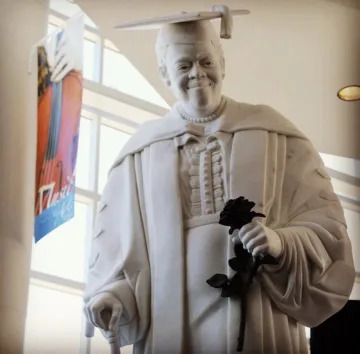
In 2016, then-Gov. Rick Scott approved a measure to remove the statue of Confederate Gen. Edmund Kirby Smith, who was born in Florida, from the Statuary Hall. The bronze was removed in September and temporarily transported to a Florida museum.
The Florida Department of State’s Division of Arts and Culture reviewed the names of more than 3,000 Floridians to replace that statue, narrowing it down to 130 potential subjects. It chose Bethune after receiving 1,233 votes in favor of her to represent the state, according to Evolve Magazine, a business publication based in Florida. The statue was temporarily on display at the Daytona State College’s News-Journal Center until Dec. 12 and will be shipped to Washington.
“Dr. Bethune embodies the very best of the Sunshine State — Floridians and all Americans can take great pride in being represented by the great educator and civil rights icon,” U.S. Rep. Kathy Castor, D-Fla., said in a statement.
Who was Mary McLeod Bethune?
Born in South Carolina in 1875, Bethune was one of 17 children. Her parents were formerly enslaved and the family picked cotton to make a living. Nonetheless, Bethune was committed to her education. She eventually graduated from Scotia Seminary, a Presbyterian boarding school for Black girls, in 1894.
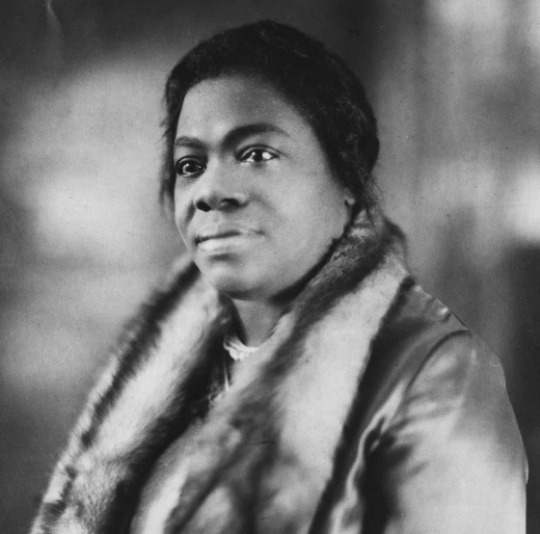
Next, she went north to Chicago to study at the Moody Bible Institute, with the goal of doing missionary work in Africa. At the time, she was the only Black student enrolled. There, she established Sunday schools in neglected parts of Chicago, worked with prisoners in city jails, and helped with the Pacific Garden Mission, which housed and fed hundreds of people each day.
When she sought an opportunity for mission work in Africa, the Presbyterian Board of Missions denied her request and instead sent her to Georgia, where she worked at a school for Black girls. Soon after, she married Albert Bethune, and eventually the couple and their child moved to Florida. While teaching in Palatka, Florida, she learned of the poor living and educational conditions of Black residents of Daytona Beach.
Soon, Bethune started a school in Daytona with a commitment to provide Black girls a higher quality education.
5 notes
·
View notes
Note
Yes. Please Open The Box. I've been on hp brainrot cause I've been rewatching the movies with my mom. Please
i feel like i have a lot of opinions that are popular opinions, and fuck terfs, but nonetheless:
regulus black would have been the perfect example of a brave slytherin that albus was named after
arthur, hagrid, or remus could have served as other father figures instead of albus; tell me hagrid would not burst into tears upon hearing his child was named after him? also, arthur, for both ginny and harry!
i read the occasional drarry fic but it has to be very, very well-written; or, at least, it has to have the understanding that draco has to go through some sort of redemption, either through atoning for his own actions, or an au in which he already has—some fics make him the next-gen spy, a bit like snape
uh, draco and dudley are perfect foils, and people would simp after dudley if he was as “conventionally attractive” as tom felton
dudley had more of a canon redemption arc than draco did
fatphobia is rampant in the series—villains are the vast majority of fat rep, and even good fat characters like molly or hagrid still have faults (hagrid is “big and dumb,” a bit like dudley tbh, and molly is kind of just? a Mother? like that’s her defining character trait. nothing wrong with being a stay at home mom if that’s what you want, of course, it’s just that molly didn’t have much of a personality outside of her children until the later books.)
misogyny too—molly was so mean to hermione in the fourth book and fleur in the sixth, ginny was mean to fleur too, hermione gives off “not like other girls” energy especially concerning lavender and pavarti
poc harry and hermione—sure, jkr says she’s cool with it, but she gets a lot of credit for the bare minimum. she could have written them that way.
there’s a whole lot of white people in hp. wish there’d been better rep
same with dumbledore! it’s so clear she said he’s gay to get better credit for rep that’s barely there, but now she has the chance to expound in it in the fantastic beasts movies, she isn’t planning on addressing it. right. okay.
should i even get into the antisemitism of the goblins
most -isms jkr ticked, tbh, and described better by other people who these -isms directly affect, so i won’t get too much more into it
wish hufflepuffs had more house rep, in general, they mostly just get cedric, and i wish that “good slytherins” were expounded upon, especially concerning the whole “no slytherins stayed” for the final battle you cannot TELL ME that there wasn’t ONE slytherin who had ambitions to fight voldemort
(i’m a ravenclaw, btw)
cho, angelina, and ginny are all overhated; movie!ginny was albeit lacking a lot of the Spice of book ginny, and movie cho got shorted bc they didn’t include marietta as the betrayer of the da, but like. god. pls chill ppl
albus probably considered that sirius was innocent but decided to leave him in azkaban, even though he didn’t know for sure; albus probably also laid out the traps for the stone with eleven-year-olds in mind, just in case harry wanted to try and prove himself; albus was behind a lot of the machinations, and at the very least he left a child to be abused for years on end
i wrote a ten page essay on why snape is a garbage person for that college class i mentioned. i got a perfect score.
like seriously i could talk about how much snape sucks and why him having a crush on lily isn’t redemption, but like. we get it. c’mon. “i see no difference,” threatening to kill a student’s beloved pet, being that student’s worst fear....... come on.
harry should have been the dada professor when he grew up. like it’s right there.
tonks is genderfluid you cannot convince me otherwise
i love wolfstar as much as the next gal, but if we get a marauders tv show slash movie, you know she’d make that shit as straight as possible. no thanks.
someone on tiktok said florence pugh as helga hufflepuff tho and. yeah.
mmm jkr really should have kept her hands off a lot of the international schools; i know she messed up at the very least native american representation, even though native americans requested she not do that, and there are really big Colonization Vibes from those expanded schools. which like, i get, bc colonization was happening, but. still. so many fics have done better with those concepts.
speaking of! fic recs! these are all on ao3
the changeling: slytherin!ginny. takes her through all seven years and addresses various kinds of magic. i absolutely adore it. harry/ginny
boy with a scar series: takes various “what ifs” about the harry potter series and writes them; mostly canon ships
sunshine in my eyes: lily is raised by professor mcgonagall. jily
true, and unafraid of toil: a character study of autistic newt scamander
the dogfather: petunia turns down taking in her son, sirius escapes azkaban much earlier, and harry’s adopted by muggles. only the first year of hogwarts is written out in full, but there’s ficlets that follow through to the end of the wizarding war. wolfstar.
(the completely unwilling participants on) the bachelor: james is the first british bachelor; lily is a journalist who is sent on the show, undercover, by her shitty boss. james/lily
swung by serafim: a characterization of snape that i do not completely hate; i avoid the last two chapters, bc i do not like snarry, it squicks me out, and i didn’t see the tags for it until the very end of the work since it gets more textual in those chapters, and also it involves real life events that feels a bit strange to write about in fic, but. that’s just me. i think there’s cho/harry/cedric in there?
turn: genuinely just one of the best-written harry potter fanfics i’ve ever read. harry after the epilogue gets sent to an alternate universe where things went a little different. drarry
the debt of time: obligatory “hermione gets sent back in time to the marauders” fic; these were super popular on fanfic.net, where i started out, but i read this recently and really really enjoyed it. sirius/hermione, remus/hermione
the pure and simple truth: everyone goes out to a bar. drarry, romione
hogwarts, to welcome you home: harry as the dada professor from mcgonagall’s perspective
stealing harry: sirius never went to azkaban, but harry still went to the dursleys for a bit. it’s written up to part of the third book, but it has notes for how the rest of the series would have turned out. wolfstar
hermione granger’s hogwarts crammer for delinquents on the run: if harry was told he was a wizard at age seventeen, instead of age eleven. drarry
the reclamation of black magic: harry’s grandmother dorea was in a coma and never died. now she’s come to adopt her grandson and seek a reckoning on the wizarding world. this is unfinished and is in harry’s first year; sirius black/remus, for a bit, but also remus/female oc and sirius/male oc; probably harry/hermione, by the end of it.
if any of you have fic recs (especially fics featuring ginny, jily, or wolfstar) (i’ve been meaning to read atyd, i’m saving it) please let me know!
20 notes
·
View notes
Text
blueberry pancakes // bucky barnes

MASTERLIST
Description: A single mother. Juggling being a mom, a full time pediatrician, and a difficult ex who believed now would be the best time to finally be a father. A soldier ripped out of time. Ex-assassin turned superhero. Learning how to balance a new domestic life with handling demons of his past, while facing the trials of the future. a love story began over something as simple as chocolate chip pancakes with hidden blueberries.
Disclaimer: I do not own any original Marvel characters! All canon plots and canon characters belong to Marvel Comics and Marvel Studios. This is an original work. You may not publish it anywhere else
Status: Edited
Note: Takes place after endgame. I have elected to ignore Tony's death and Steve's leaving. Did not happen. Quick Reminder! My works are only published here, AO3 and on Wattpad, thank you.
Chapter Ten: The One with the Phone Call
Warnings: Mention of alcohol
Word Count: 2700
If we're being honest, Lily Osborne's past was no different than most. She was raised in an upper-middle-class family. Her parents were renowned scientists who were credible in their field and brought home their findings. Other than her parent’s overly obsessive need to have everything recycled, there wasn't much about Lily that was interesting or stuck out. Nothing that she really believed to be interesting at least. Two loving parents, who were still married. Two younger siblings whom she loved dearly. A steady career and a lovely child. She was living the overused and overly generalized, 'American Dream'. the only slight oddity of Lily's life was how young she was when she had Hunter and the fact she was only mid-thirties and already divorced. But other than that...she was a basic, domestic, woman.
That's not how Bucky saw it though.
He found her astonishing. Admirable, even. The fact she was able to complete a Ph.D. level of education, graduating as valedictorian, at the top of her class, was enough to make his heart reach out to grab onto hers. But what really intrigued him, was her ability to be descriptive but vague all at the same time. She spoke about her divorce, but never the contents. Never diving deeper than the surface of it. How she gained primary custody, and that it was due to an affair. He learned everything, and nothing, all at once. He was only able to make a general picture of who Lily Osborne was, nothing more than the basics.
"Osborne, you said?" Bucky commented, shifting in his seat as he sipped on a beer that he held in his naturally warmed hand, "I feel like I've heard of the name Osborne in the environmental field before..."
The comment he made cause Lily's eyebrow to perk up. From the sound of it, Bucky had just admitted to being a bit of a science nerd. The fact he recognized the Osborne name just from Lily mentioning her parents. It was endearing, really. The fact he let that little tidbit of information slip out, not even realizing he had. Lily had made note of it, ensuring she remembered in case they were lucky enough to have a conversation like this again. Learning about one another, becoming more educated on their pasts.
But just like the supersoldier, Lily had secrets. Maybe not as extreme, but nonetheless, they were secrets. She wouldn't give him the full story of anything. Just the slightly important details. It was like a burger, sort of. She gave him the bun, but not the meat in the middle. If she was open and honest with him, that would open up a case of vulnerability. And though a talented doctor, Lily would not be able to cure it. It'd be the crack in her armour he could use to bring her down if he so wished.
"Probably from their discoveries about eco-friendly teddy bears. They still give me nightmares." Lily chuckled, sipping the ale that Bucky had given her. Though she had elected not to drink, the small voice in Lily's head convinced her that one beer wouldn't be too harmful. She wouldn't lose her morals just from a beer. She'd never been like that.
"Yes yes, I've seen Starks kid wandering around with one. They're terrifying," he replied, steel eyes reflecting the glow of the moon that provided them with the romantic ambiance that swirled around them. The whole scenery around them was more romantic than most of the dates Gen had set Lily up on in the past. It was genuine and natural, nothing forced or rushed to make it happen. But the demons inside of Lily's heart were screaming at her to run, get out of there while she still could. However, her feet stayed planted, and her butt sat in the lawn chair. She wasn't going anywhere.
Lily was still mortified of any sort of relationship. This wasn't one of those cheesy situations where the moment she met Bucky, her fears disappeared. That all of those years of emotional manipulation and toxicity had just vanished from her psyche. Lily hadn't changed because she met Bucky. The scars on her heart were still there, and just like her, had no intention of leaving. Sure, she was attracted to him. He was a fine specimen, had a voice that was as smooth as butter that created goosebumps on her arms. His presence brought a warm blanket of comfort that he would drape around her shoulders. But the pain still sat heavily on her shoulders. All of the damage Scott had caused to her mental state and self-image. They still stood, strong and sturdy. Lily was still Lily. The same girl who had been in a troublesome relationship and managed to emerge the other end. And that's all there was to it.
Change can happen. It's just not an immediate thing.
"You've mentioned that you've been through a divorce. How long ago was that?" Bucky inquired, his phrasing eluding the fact he wanted to know more. He had a hankering for the knowledge of Lily's past. To know what she's been through. What made her the shy and meek girl in front of him. What about her history created such a fragile state of mind, yet such a strong and independent visionary. A single mother, a full-time doctor, yet riddled with anxiety.
Bucky's trained eye could see the signs. The tapping of her fingers, the shortness of her breath. The way her collarbone heaved up and down at a faster pace whenever she spoke, or even when he asked her a personal question. How she never seemed to make eye contact with him. God, he wanted her to. He wanted to see those beautiful green eyes match with his. Memorize every detail of her face. The curve of her nose. the arch of her brow. Bucky wanted to render it into his mind, so he would never forget it. So he could always have the picture of those forest green eyes in his mind. The stories they held. The pain they kept locked away. But she never would long enough for him to capture their beauty. If Lily ever caught his eyes, she'd avert them within a millisecond. He'd watch as she'd turn her head, staring out into the sky.
"Four years ago. Seven years of marriage later." Lily answered after a few moments of pause. Her cheeks heated up in a red hue at the mention of her marriage. All of the pain she went through welling up in her throat as she attempted to wash it away with the beer in her hand. The words he would use were stitched into her skin, the things he would call her. She was a ragdoll in the eyes of Scott Harvey. He would take her lifeless body and sew in the worst of the English language onto her skin. It wore her down, the emotional trauma she suffered. But Lily came out on the other end, broken down and beaten sure, but still alive.
"And Hunters your only one?" Bucky inquired, studying the way that Lily fidgeted under his glance. It wasn't as if she was nervous around him, no. From the first time he met her, she seemed to relax around his presence. It was something about everyone that made her nervous. She was a survivor of something, on top of seemingly just always being a shy person. Introverted and hidden away. Add the emotional drainage she suffered all of those years, it made her a shell almost. Bucky was trained to catch small signals, the details others wouldn't care to look at. And all of Lily's body was littered with the little things, the way she breathed, to the way her cheeks always held a red hue.
Lily Osborne had piqued the interest of James Barnes. Not just in a romantic way, though that was a major factor. No, she had different layers to her. Different parts that all connected to create the woman that sat across from him. The way her eyes were slightly sunk in from years of work. Yet her hands seemed soft and velvety smooth, the hands of a mother. The way her arms always sat across her lower stomach, crossed in a way that hid that small part of her body. All signs leading towards insecurities, anxieties, a constant need to have a wall up. Not only did Lily create an opposing side of Bucky, but he saw himself in her. The part of himself that was locked away in a cell in the back of his mind. Constantly doubting, reminding him of the pain he caused. But she wore it on her sleeve, as though it had managed to free itself and take over her persona.
"Yes, he's my one and only. Something inside of me knew I wouldn't want another with my ex-husband, so I made sure measures were taken so there wouldn't be a chance of another until I was ready," Lily answered, crossing her legs and readjusting the dress in an attempt to cover the bit of thigh that she had revealed, "He's the only male I need...my son's everything to me."
Whenever Hunter is ever brought up in conversation, Lily's heart grew four sizes. He was truly the rock in her life that kept her tethered to reality. If he was gone, well Lily wouldn't know what to do. Having a child so early in her life was never something that the blonde had anticipated, nor wanted. She had a whole life plan ahead of her. Get her degree, get her Ph.D., find a husband, then start thinking about a family. Instead, she got pregnant, got a husband, then got a Ph.D. and her degree. The complete opposite of what she had originally planned for herself. Lily was far from ready to be a mother at the age of 22, but she knew she could never, ever, give up her child. So, miraculously, she made it work. Through hours of crying and yelling trips to Gen's and her parents, she did it. And managed to raise a happy, healthy, baby boy.
"There you two are!" a familiar voice rang after Lily had finished her inner monologue about the love she had for her son. Rose. And in tow, were a few of the Avengers and a quite inebriated Genevieve Fairchild, hanging loosely onto a seemingly amused Steve Rogers. As the group paraded around the two, Lily's younger sister spoke, "You lovebirds have been up here for an hour. Gen thought you died."
Lily let out a Gentle sigh before standing from the couch that you'd typically find on a porch, but it was on a roof and went to alleviate the Captain of her intoxicated best friend. Whom, Lily could only guess tried to drink Thor or somebody under a table. Another thing about the doctor’s best friend, she never backed away from a challenge. Even when it came to going head to head against a literal God when it came to drinking. It really sometimes surprised Lily that Gen had survived this long. But, if we're honest, it's because Lily had been babysitting her for close to twenty years. That's about the only reason.
"I take it back. I have two kids. This is Genevieve, she owns the cafe you guys go to," Lily smiled, wrapping her arm around her best friend’s waist and leaning Gen into her side, to keep her up. The last thing that Lily wanted was to have her best friend pass out in front of a cute guy, as well as the literal Avengers. That would just be embarrassing. Not to mention, Gen would have passed out and that would require a hospital visit, somewhere Gen hated for some reason that even Lily didn't know, "We should get her home. Thank you for hav-"
"Gotcha," Gen grinned while shoving her fingers into Lily's side, causing the blonde to jump. Untangling herself, Gen dropped herself down onto the couch while throwing herself into a giggle fit at Lily's surprised face. The others around chuckled softly at the practical joke, before Gen piped up, "Told you she'd fall for it, Rose. Every party we've ever been to it happens. And every time, Lily goes all mom mode on my ass."
A conversation erupted after Gen's comment, and Lily just shook her head and joined the brunette on the couch that sat parallel to the chair Bucky occupied. Both Lily and he seemed to stay silent as the group around them laughed and created a merry atmosphere. Instead, they snuck shy and reciprocated glances at one another, both erupting in a fit of blushes anytime they made eye contact. Of course, this didn't go unnoticed, but instead of causing an uproar, the group just smiled at the two. They were like two school kids who had a crush on one another but were too shy to say anything. Stealing glances from across the classroom and having nervous conversations filled with short answers. It was endearing, yet aggravating.
Rose and Gen knew the damage that had been caused to Lily's perception of love. They were the two closest people to Lily, and were there for every step of the divorce, each tear, each time she screamed into a pillow, each time she shot one too many drinks in an effort to forget the pain that reverberated from her heart. The endless nights of Lily calling one of them in tears because Scott went out and had yet to come home. Or when he did, smelled of another woman. But Lily always, always, ignored the bright red sign that said he was no good for her. Rose and Gen were the two people in the world that knew Lily more than she knew herself. They saw the flowers that bloomed inside of her and the beauty that could rise from the ashes if she just allowed it. If Lily allowed herself happiness, they would witness the rebirth of her. See her smile for no reason again, dance around her house, and sing without the help of alcohol. God...her voice was angelic. But it had been ages since anyone had heard it.
Scott had stolen her voice. stole the one thing that really separated Lily from the pack. he kept it hidden as a token of the pain he had caused. a memento of the heart he had shattered with one hand while twisting a knife into Lily's back. he managed to keep it locked away for years, and Lily had grown weary and tired of fighting, and gave up. she stopped searching for the light inside of her he put out. she didn't believe it was possible for her candle of light to be lit once again. all because some son of a bitch decided to crush her life like she was nothing but a bug.
-----
The clock struck midnight, and Lily laid draped in Gen's arms on the same outdoor couch. Her best friend’s arm draped along her shoulder, a blanket that bruce had grabbed laying on top of them to keep the crisp September air at bay. Everyone was having a lovely time ignoring the party that raged down below them, that had slowly begun to dwindle down and grow quiet. Now, instead of booming music with deep bass, Lily's ears were filled with the laughter of her new friends that surrounded her as jokes and stories were exchanged. It was peaceful, and at that moment, Lily felt calm. Her palms were soft, with no sweat in sight. Her breathing was steady, and her mind stayed on one thought. There was no spiralling, no intense paranoia. just...peace.
Then her phone rang.
Hunter's contact popped up, and that calm heart rate skyrocketed in an instant. Not only was it an odd time to get a call from her son, but he was at Scott’s. if there was an issue, Hunter would go to Scott. This in itself sent that peaceful feeling that Lily had flying out the window. Throwing off the blanket, she slid her phone across the screen and stood, pushing herself up from the couch. Excusing herself off to the side, Lily's hands grew warm and clammy.
"Hunt? Baby, what's wrong?"
"Mama please come pick me up.”
#bucky barnes#bucky barnes fanfiction#bucky barnes x female oc#james bucky barnes#bucky barnes fluff#original female character#female oc#OC#oc tag#oc x canon#marvel#marvel fanfiction#the winter soldier#the avengers#fanfiction#fanfic#tfatws#single mom#sebastian stan#fluffy#romance#comedy#james buchanan barnes
13 notes
·
View notes